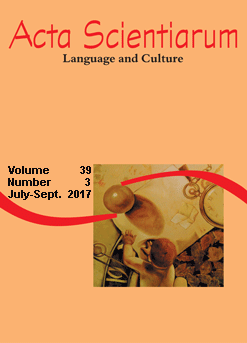<b><i>The deep search of knowledge</i>: George Chapman's glosses in <i>The Shadow of Night</i> (1594)
Resumo
This paper addresses the glosses of the first edition of George Chapman's philosophical elegy, The Shadow of Night (1594), as a specific and common practice of prescriptive work, produced by Renaissance authors following the ancient tradition of the auctoris interpretatio. Assuming the gloss as an exposition and scrutiny of the places of poetic invention and elocution, Chapman puts himself in the position of both annotator and authorizer of his text, defining a particular legibility for the poem within the learned circles of the English court of Shakespeare’s time. Considering the view of the glossarial practice as an emulation of the ancient scholium work of ‘exposing the difficulties’ of a literary text and thus legitimizing it as fit to enter the proper tradition, this paper discusses, 1. the implications of Chapman's glosses for the poem's immediate reception; 2. the importance of authorized role models (Servius, Macrobius, Cornutus) for the glossarial practice; and 3. the idea that a text does not possess a congenital clearness of its own, but can only be understood through the continuous process of a specific glossarial assessment.
Downloads
DECLARAÇÃO DE ORIGINALIDADE E DIREITOS AUTORAIS
Declaro que o presente artigo é original, não tendo sido submetido à publicação em qualquer outro periódico nacional ou internacional, quer seja em parte ou em sua totalidade.
Os direitos autorais pertencem exclusivamente aos autores. Os direitos de licenciamento utilizados pelo periódico é a licença Creative Commons Attribution 4.0 (CC BY 4.0): são permitidos o acompartilhamento (cópia e distribuição do material em qualqer meio ou formato) e adaptação (remix, transformação e criação de material a partir do conteúdo assim licenciado para quaisquer fins, inclusive comerciais.
Recomenda-se a leitura desse link para maiores informações sobre o tema: fornecimento de créditos e referências de forma correta, entre outros detalhes cruciais para uso adequado do material licenciado.




















6.png)









